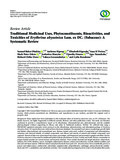Please use this identifier to cite or link to this item:
http://ir-library.mmust.ac.ke:8080/xmlui/handle/123456789/2478| Title: | Traditional Medicinal Uses, Phytoconstituents, Bioactivities, and Toxicities of Erythrina abyssinica Lam. ex DC. (Fabaceae): A Systematic Review |
| Authors: | Obakiro, Samuel Baker Kiprop, Ambrose Kigondu, Elizabeth K’Owino, Isaac Odero, Mark Peter Manyim, Scolastica Omara, Timothy Namukobe, Jane Owor, Richard Oriko Gavamukulya, Yahaya Bunalema, Lydia |
| Keywords: | Traditional, Medicinal, Uses, Phytoconstituents, Bioactivities, Toxicities, Erythrina abyssinica , Lam. ex DC, (Fabaceae), Systematic, Review |
| Issue Date: | 4-Mar-2021 |
| Publisher: | Evidence-Based Complementary and Alternative Medicine |
| Abstract: | Background. Many studies have been undertaken on the medicinal values of Erythrina abyssinica Lam. ex DC. (Fabaceae). The details, however, are highly fragmented in different journals, libraries, and other publication media. This study was therefore conducted to provide a comprehensive report on its ethnobotany, ethnomedicinal uses, phytochemicals, and the available pharmacological evidence supporting its efficacy and safety in traditional medicine. Method. We collected data using a PROSPERO registered systematic review protocol on the ethnobotany, phytochemistry, and ethnopharmacology of Erythrina abyssinica from 132 reports that were retrieved from electronic databases. Documented local names, morphology, growth habit and habitat, ethnomedicinal and nonmedicinal uses, diseases treated, parts used, method of preparation and administration, extraction and chemical identity of isolated compounds, and efficacy and toxicity of extracts and isolated compounds were captured. Numerical data were summarized into means, percentages, and frequencies and presented as graphs and tables. Results. Erythrina abyssinica is harvested by traditional herbal medicine practitioners in East, Central, and South African communities to prepare herbal remedies for various human and livestock ailments. These include bacterial and fungal infections, tuberculosis, malaria, HIV/AIDS, diarrhea, cancer, meningitis, inflammatory diseases, urinary tract infections, wounds, diabetes mellitus, and skin and soft tissue injuries. Different extracts and phytochemicals from parts of E. abyssinica have been scientifically proven to possess anti-inflammatory, antibacterial, antioxidant, antiplasmodial, antiproliferative, antifungal, antimycobacterial, antidiarrheal, anti-HIV 1, antidiabetic, and antiobesity activities. This versatile pharmacological activity is due to the abundant flavonoids, alkaloids, and terpenoids present in its different parts. Conclusion. Erythrina abyssinica is an important ethnomedicinal plant in Africa harboring useful pharmacologically active phytochemicals against various diseases with significant efficacies and minimal toxicity to mammalian cells. Therefore, this plant should be conserved and its potential to provide novel molecules against diseases be explored further. Clinical trials that evaluate the efficacy and safety of extracts and isolated compounds from E. abyssinica are recommended. |
| URI: | https://doi.org/10.1155/2021/5513484 https://www.hindawi.com/journals/ecam/2021/5513484/ http://ir-library.mmust.ac.ke:8080/xmlui/handle/123456789/2478 |
| Appears in Collections: | Gold Collection |
Files in This Item:
| File | Description | Size | Format | |
|---|---|---|---|---|
| Traditional Medicinal Uses, Phytoconstituents, Bioactivities, and.pdf | 3.24 MB | Adobe PDF |  View/Open |
Items in DSpace are protected by copyright, with all rights reserved, unless otherwise indicated.
